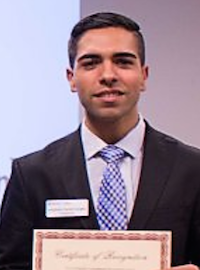Drawing inspiration from social movements and organizers across countless generations, I serve my community as an advocate for positive change and an ally for the voiceless. With a background in Political Science and a passion for debate, I constantly challenge my own opinions in favour of broadening my perspective and hearing the stories of others. As an HBA, I am motivated to challenge the boundaries inherent in institutionalized leadership education by applying my skills wherever I can in my community. While my professional aspirations involve consulting, I intend to actively address poverty-alleviation, LGBTQ rights, and corporate social responsibility throughout my life.
Additional Information
What is your personal definition of sustainability?
I envision sustainability as a balance – a perspective on individual, collective, and corporate processes that considers all possible consequences and outputs in order to reconcile both wasteful actions and wasteful thinking. Sustainability is a hidden necessity for the prosperity of future generations, all too often hidden under the guise of public relations and advertising. Sustainability, in its truest form, is a deeper connection with the community that we are each living in, bridging the individual to their surroundings, and demanding a sense of moderation in the short term to allow for our collective well-being in the future.
What role do you see sustainability playing in your professional career?
My passion for sustainability will influence my approach to problem-solving and decision making, no matter what role I’m involved with. A key priority of mine throughout Ivey has been retaining and strengthening my existing values; I intend to continually build on this priority throughout my professional career. My desire to pursue corporate strategy with both the environment and the Global South in mind will be advantageous to expanding my international horizons and fostering cultural dependencies as the world becomes more connected.
While sustainability is increasingly seen throughout the corporate world, I feel an immediate tension between my belief in environmentalism and social equality and the unsustainable practices that may be inherent within different industries. This tension, rather than discouraging me, will bolster by beliefs and push me to advocate for these values, even in unfamiliar territories or resistant organizations. Sustainability and its influence on my ethics will empower me to be more mindful on work projects and my choice of roles.
What sustainability projects have you been engaged in?
In first year, I started an organization advocating for corporate social responsibility called Interconnect. The organization helped raise CSR awareness amongst undergraduate students by hosting critiques and discussions of popular companies employing sustainable practices. We partnered with an international bank to organize a case study surrounding the bank’s options for expanding its CSR practices in Pakistan.
In 2015, I participated in Ivey’s Community Consulting Project, serving as a pro bono consultant for United Way London Middlesex tasked with addressing the charities donor retention problems. This experience exposed me to the realities of income inequality in London, as well as how the knowledge I’ve gained from Ivey can be applied to implement sustainable solutions for community groups.
I also had the privilege of participating in Western’s 2016 Hult Prize. Along with my teammates, I proposed an enterprise centred on free consulting services for small to medium enterprises in Dar es Salaam, Tanzania. The experience widened my understanding of the problems faced by SMEs in Africa and empowered me to see ways of addressing human capital deficits in the Global South.
This summer, I intend on researching sustainable practice opportunities through a thought leadership project at the consulting firm I am working.
